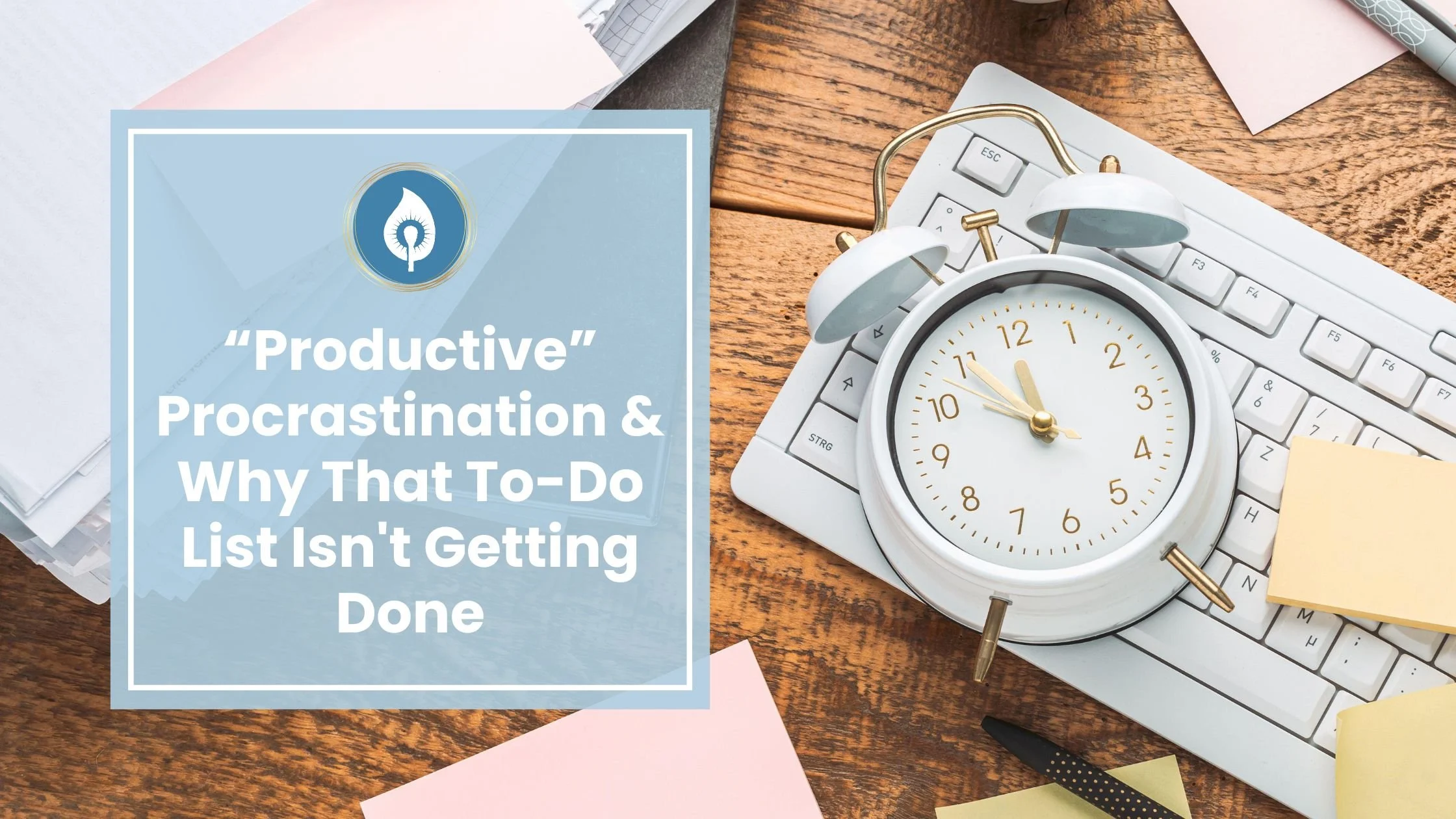“Productive” Procrastination and Why That To-Do List Isn't Getting Done
You know that feeling when you've been "working" all day, but somehow the most important items on your to-do list remain untouched? You've been busy—researching best practices, reorganizing your digital files, creating detailed project timelines, clearing your inbox—yet there’s a nagging feeling that you're not making real progress on what matters most.
This is what I like to call "productive” procrastination—those sneaky tasks that feel like work but actually keep us from taking meaningful action. I want to share the three most common flavors of procrastination I see among library leaders, and more importantly, how to recognize when these seemingly productive activities are actually holding you back from your biggest breakthroughs.
The Research Rabbit Hole: When "Due Diligence" Becomes Delay
As a leadership coach, I once worked with a library administrator who had been "researching" a new community programming initiative for six weeks. They had compiled reports, read case studies, analyzed demographic data, and created spreadsheets comparing similar programs across four different library systems. When I asked when they planned to pilot the program, they said, "I just need to research a few more examples to make sure I have all the information I need."
Sound familiar?
The research trap is particularly seductive for us library professionals because we're literally trained to be thorough information gatherers. But, here's the thing: there's a difference between strategic research and research as procrastination. When we tell ourselves, "If I research this thoroughly enough, I'll have perfect information for flawless execution," we're actually avoiding the vulnerable act of putting ourselves and our ideas out there.
The unpleasant truth is, you'll never have perfect information. The best data comes from actually trying something and learning from the results. Instead of researching for six weeks, the library administrator realized they could have planned a small pilot program and gathered real-world feedback… Which is exactly what they went on to do, gathering far more valuable data than any case study could have provided.
The Organization Obsession: When Perfect Systems Replace Perfect Progress
I once spent an entire week organizing my tasks in Asana, my online project manager. I created new project headings, subheadings, and custom fields. I renamed documents with consistent naming conventions and linked them accordingly. I even color-coded each project, complete with cute emojis. By Friday afternoon, I felt incredibly productive—until I realized I had spent HOURS organizing but not actually working on any of the projects those beautifully arranged tasks were meant to support.
This is the organizing trap in full effect. We convince ourselves that if we just arrange everything perfectly, we'll be set up for optimal efficiency. But here's what I've learned the hard way: the most organized filing system in the world won't help you if you never actually create the content to fill it.
The reality is that organization should serve action, not replace it. Yes, having systems matters, but you can organize as you go. Start with "good enough" systems and improve them based on what you learn through doing the work.
Planning Paralysis: When Every Contingency Becomes a Roadblock
Strategic planning is literally part of your job description as a library director or manager. You're responsible for creating a compelling vision, setting goals, and mapping out how to get there. But there's a fine line between strategic planning and planning as procrastination.
The planning trap sounds like this: "If I plan for every possible scenario and outcome, I can prevent failure and avoid conflict." So we create comprehensive strategic plans with multiple contingencies, detailed timelines that account for every possible delay, and risk assessments that cover scenarios that we’ll likely never encounter.
Meanwhile, that innovative programming idea sits in planning limbo for months. That staff development initiative gets pushed back another quarter. That community partnership opportunity passes us by while we’re still mapping out implementation strategies.
Here's what I've learned from coaching dozens of library leaders: the most detailed plan in the world can't eliminate uncertainty. In fact, over-planning often creates more problems than it solves because it makes us rigid and unable to adapt when reality inevitably differs from our projections.
Instead of planning for every contingency, plan for learning. Create a basic framework, identify your first few action steps, and build in regular check-ins to adjust course based on what you discover along the way.
Moving from “Productive” Procrastination to Purposeful Action
The common thread in all three of these procrastination patterns is perfectionism—the belief that if we just do enough research, create perfect systems, or plan for every scenario, we can guarantee success and avoid failure. But perfectionism is actually the enemy of progress.
Here's the shift I want you to make: instead of asking "How can I make this perfect?" ask "What's the smallest step I can take to move this forward?" Instead of "What could go wrong?" ask "What could I learn?"
Your staff and your patrons don’t need you to be perfect—they need you to be present, engaged, and taking action on the things that matter. That innovative program you've been researching? Launch a small pilot. That strategic initiative you've been planning? Start with one concrete step this week. That organizational system you've been perfecting? Use it as-is and improve it along the way.
Your Next Step Forward
You became a library director or manager because you want to make a lasting impact in your community. But impact doesn't come from perfect research, flawless organization, or comprehensive planning—it comes from taking action, learning from the results, being transparent with your team, and adjusting course as you go.
The beautiful thing about recognizing these procrastination patterns is that you can immediately start redirecting that energy toward meaningful action. You already have the experience, skills, and dedication to create positive change. Now it's time to channel those strengths into forward movement.
If you're tired of feeling busy but not productive, if you're ready to move from planning to doing, I have something that can help. I’ve developed Sustainable Productivity, a four-week live online course specifically designed for library directors and managers who want to transform their leadership through proven productivity systems.
This isn't another generic time management program. It's a comprehensive system that teaches you to align your daily actions with your values, master strategic goal-setting for library initiatives, and establish sustainable rhythms that enable you to lead with greater impact while maintaining the work-life balance you deserve.
Ready to transform overwhelm into excellence? Join the Sustainable Productivity waitlist here and take the first step toward leading with greater impact and intentionality.






